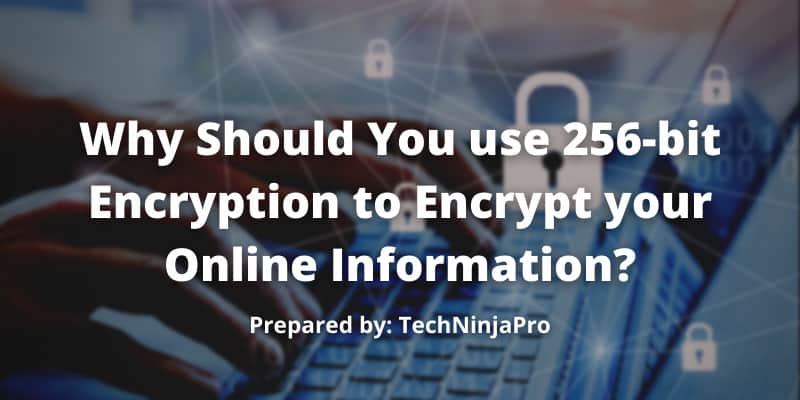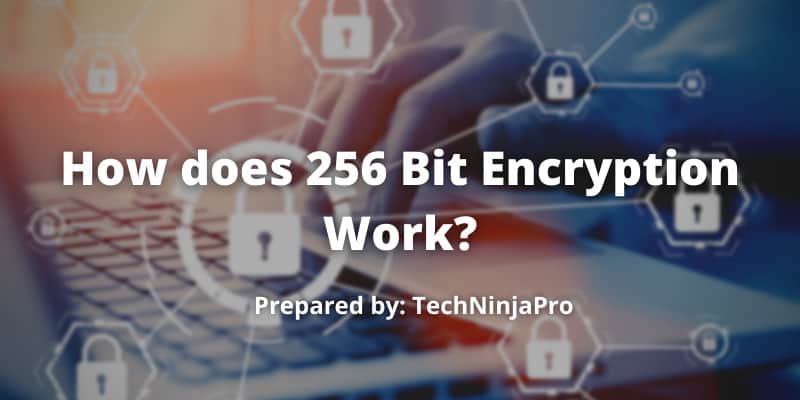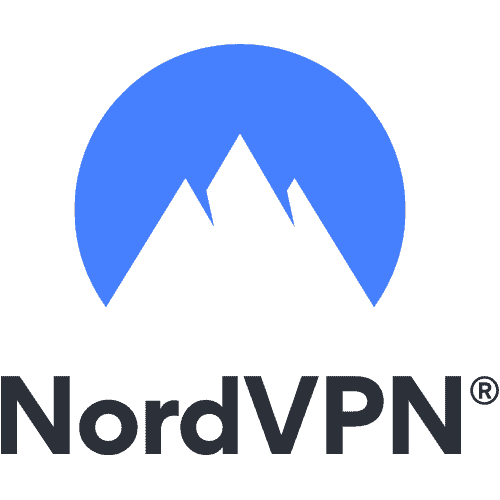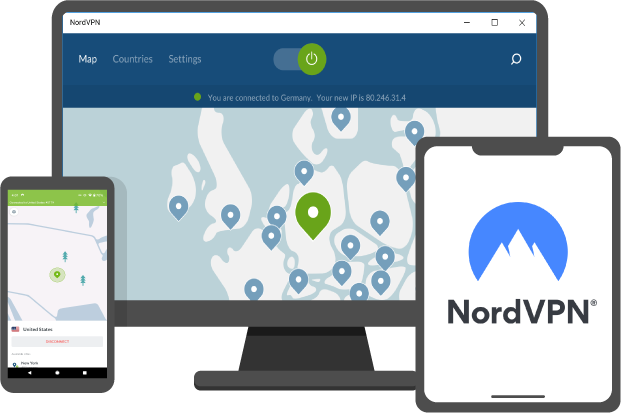Cybercriminals are always hunting for broken links in sites, security lapses in software codes or scripts, and loopholes in the network to enter and fulfill their malevolence desires. How can users, especially in this modern, connected world, have complete assurance that their data is safe, wherever it may be located?
In this modern world, data security is the essential element, and hence business owners always prefer to use encryption security to protect their important information to secure their digital business.
Encryption is one of the most common elements to protect important data. Encryption works by capturing plain text and converting it into ciphertext, consisting of seemingly random characters. Only those people who have the special key can decrypt it.
- What is 256-Bit encryption and Why it is important?
- Why Should You use 256-bit Encryption to Encrypt your Online Information?
- Common Uses of 256 Bit Encryption
- How does 256 Bit Encryption Work?
- Best VPNs Powered with 256-bit encryption
What is 256-Bit encryption and Why it is important?

256-bit encryption is a data encryption technique that uses a 256-bit key to encrypt and decrypt files or data transferred between the client and the server. It is one of the secure encryption techniques after 128 and 192-bit encryption and is used in various modern encryption algorithms, protocols, and technologies, including AES and SSL.
When TechNinjaPro talks about 256-bit encryption strength, it refers to the length of the algorithm’s key used to encrypt the information and its resistance to attacks. The bigger the algorithm key size, the more difficult it is to crack using brute-force attacks.
In the golden old day, when everything was written on paper, this required converting a letter into something else. But when it comes to current information or information stored on computers, these letters are stored in terms of binary digits or bits of data, meaning 0s and 1s.
You might have seen 256-bit encryption in any TLS/SSL certificate’s description. This means it needs 2256 different number combinations. To decrypt a ciphertext that is encrypted with 256-bit encryption without the corresponding private key, it would take 3.31 x 1056 years!
Why Should You use 256-bit Encryption to Encrypt your Online Information?

Encryption is essential because it allows you to safely protect the information you do not need anyone else to access. Businesses use it to safeguard company secrets, governments use it to secure confidential information to protect top-secret files, and many individuals use it to protect private information to guard against things like identity theft.
You can use encryption to safely protect folder contents, which could contain emails, tax information, chat histories, credit card numbers, or any other sensitive data. This way, if your computer is stolen, that information is safe.
Encryption is essential for anybody who is sharing personal information online. Many VPN services are powered by self-engineered and optimized servers secured with 256-bit encryption, which offer users the highest level of anonymity to avoid brute force attacks.
- Masks your IP address: When connected with 256-bit encryption, your IP address is covered by a virtual IP address to provide you with ultimate security to protect your information.
- As a doctor/patient: For example, if you are a patient communicating with the doctor, you would need to use 256-bit encryption so that nobody can snoop on your messages about your private health concerns.
- Shopping: If you are buying things online, ensure you have got a 256-bit encrypted internet connection so that when you are making the payment, your financial information is secured from the prying eyes of hackers or cybercriminals.
- Government: The state uses 256-bit encryption to secure key important documents and national security conversation to ensure that the information is protected against critical global cyberattacks by states and hackers.
- Journalist: As a journalist, your key concern is to secure your online sources for security purposes. Using 256-bit encryption proves helpful in guarding your research, revelations, and sources from unwanted attention.
- Human Activist: If you stand up for a cause, you get unwanted attention from groups that need to harm your personal agenda. Using 256-bit encryption can secure your crucial progress and communications with individuals and groups online so that no one will get access to what you are working on, as it can put yourself and your contacts at risk.
- Travelers: Traveling is always fun until you are locked out of your social media accounts or fall victim to a hack. When traveling abroad, 256-bit encryption secures your internet activities, especially when you are on a public network. All it would take is to connect a VPN service that uses 256-bit encryption and enjoy online browsing and streaming.
Common Uses of 256 Bit Encryption
256-bit encryption is considered the market standard. It is used in a lot of different ways. Some of the most common uses of 256-bit encryption are as follows:
- To encrypt information in transit between a server and a browser.
- To encrypt information stored in an email to offer data at rest protection.
- To generate symmetric session keys by browsers to start a secure TLS/ SSL connection
- To encrypt the stored information on third-party cloud platforms like Google Drive, Dropbox, AWS, etc.
- To encrypt the private information owned by the military and government.
How does 256 Bit Encryption Work?

256-bit Encryption shows the length of the encryption key. The information transferred between users’ browsers and the site’s servers is encrypted using 256-bit encryption keys.
- When an internet user tries to access a website, their internet browser chooses the strongest encryption algorithm available between itself and the server to create a random session key. 256-bit encryption is the market’s standard level of encryption strength and is used to make the session key. The session key will be used to decrypt and encrypt the information.
- The session is encrypted using the site’s SSL certificate’s public key. The session key is encrypted using the 2048-bit key and sent to the site’s server.
- The server must possess the corresponding private key to decrypt the session key.
- Once the server decrypts the session key and gets access, the safe SSL connection starts between the internet browser and the server.
- Now, the information in transit between the server and the internet browser is encrypted and decrypted using the same session key. Session keys are symmetric. The same key is shared between an internet browser and the server for that particular session. This specific key expires as soon as the session expires.
Is Using 256 Bit Encryption Secure?
All the TLS/SSL certificates provide the same level of encryption regardless of brand, cost, or validation level. None of those things factor into the encryption strength. This means that a $10 domain validated SSL certificate provides the same encryption as a more expensive validation certificate.
The encryption strength you get with a TLS/SSL protocol depends on the internet browser’s capabilities, the server in question, and how they are configured. In some cases, 256-bit encryption may offer a security level of 128 bits. So if your network server and the client’s internet browser are appropriately configured and capable of handling 256-bit encryption, then you can relax with the knowledge that any data passing between the two is as safe as possible.
Best VPNs Powered with 256-bit encryption
ExpressVPN

ExpressVPN is the most renowned best VPN service for privacy in the market. It offers excellent privacy features and VPN protocols like OpenVPN, SSTP, and PPTP protocols. ExpressVPN also provides 256-bit military-grade encryption for ultimate secrecy and privacy. Its kill switch feature adds a cherry on top in the security scenario.
Moreover, it offers a PFS and SHA-512 hash message authentication code, making it one of the market’s most secure and no-logs VPN. In terms of network coverage, it has more than 3000 servers worldwide. These servers are optimized to provide excellent encryption and security.
NordVPN

NordVPN is another well-known VPN service that subscribers can use to secure their internet privacy. This service offers more than 5500 servers in around 50 countries. Not only that, it offers 256-bit military-grade encryption alongside a unique double VPN feature that can encrypt user’s internet traffic twice for an added layer of security.
NordVPN supports both IKEv2/IPSec and OpenVPN protocol. Best of all, it offers six multi-logins and a 30-day money-back guarantee. Moreover, its double VPN technology allows you extra security by routing the internet traffic through multiple VPN servers.
Surfshark VPN

Surfshark VPN is another leading VPN service yet affordably priced VPN for security that you can use to get ultimate protection. It offers around 3500 servers across 60 countries and provides protocols like OpenVPN, IKEv2, WireGuard, and L2TP. Surfshark is one of the outstanding VPN services despite the heavy security and protection protocols.
Surfshark works with all streaming sites and provides a bufferless experience. It also offers 256-bit military-grade Encryption and DNS leak protection. Surfshark is compatible with macOS, Linux, Windows, iOS, Android, and more. It also provides a kill switch feature and other excellent security features like MultiHop, CleanWeb, and much more.





